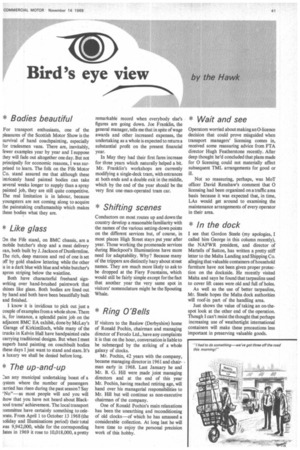Bird's eye view by the Hawk * Bodies beautiful For
Page 43

If you've noticed an error in this article please click here to report it so we can fix it.
transport enthusiasts, one of the pleasures of the Scottish Motor Show is the mrvival of hand coachpainting, especially For tradesmen vans. There are, inevitably, Fewer examples year by year and I suppose :hey will fade out altogether one day. But not principally for economic reasons, I was surprised to learn. The folk on the Fife Motor Co. stand assured me that although these intricately hand painted bodies can take several weeks longer to supply than a spray painted job, they are still quite competitive. The real limitation is in labour, because youngsters are not coming along to acquire the painstaking craftsmanship which makes these bodies what they are.
'lc Like glass
Dn the Fife stand, on BMC chassis, are a mobile butcher's shop and a meat delivery van, both built by J. Jackson of Dunfermline. The rich, deep maroon and red of one is set If by gold shadow lettering while the other is in a dark blue with blue and white butcher's apron striping below the waistline. Both have characterful freehand signwriting over hand-brushed paintwork that shines like glass. Both bodies are lined out. by hand and both have been beautifully built and finished. I know it is invidious to pick out just a couple of examples from a whole show. There is, for instance, a splendid paint job on the adjacent BMC EA exhibit, done by McLay's Garage of Kirkintilloch, while many of the trucks in Kelvin Hall have handpainted cabs carrying traditional designs. But when! meet superb hand painting on coachbuilt bodies these days I just want to stand and stare. It's a luxury we shall be denied before long.
* The up-and-up
an any municipal undertaking boast of a .ystem where the number of passengers :arried has risen during the past season? Say `No"—as most people will and you will bow that you have not heard about Black)ool trams' achievement. The local transport ;ornmittee have certainly something to celePrate. From April 1 to October 13 1968 (the ioliday and Illuminations period) their total vas 9,942,000. while for the corresponding iates in 1969 it rose to 10,018,000, a pretty remarkable record when everybody else's figures are going down. Joe Franklin, the general manager, tells me that in spite of wage awards and other increased expenses, the undertaking as a whole is expected to return a substantial profit on the present financial year. In May they had their first fares increase for three years which naturally helped a bit. Mr. Franklin's workshops are currently modifying a single-deck tram, with entrances at both ends and a double exit in the middle, which by the end of the year should be the very first one-man-operated tram car.
* Shifting scenes
Conductors on most routes up and down the country develop a reasonable familiarity with the names of the various setting-down points on the different services but, of course, in most places High Street stays put year after year. Those working the promenade services during Blackpool's Illuminations have more need for adaptability. Why? Because many of the trippers are distinctly hazy about street names. They are much more likely to ask to be dropped at the Fiery Fountains, which would still be fairly simple except for the fact that another year the very same spot in visitors' nomenclature might be the Spouting Whale.
* Ring O'Bells
If visitors to the Baslow (Derbyshire) home of Ronald Pochin, chairman and managing director of Ferodo Ltd., have any complaints it is that on the hour, conversation is liable to be submerged by the striking of a whole galaxy of clocks. Mr. Poehin, 42 years with the company, became managing director in 1961 and chairman early in 1968. Last January he and Mr. B. G. Hill were made joint managing directors and at the end of this year Mr. Pochin, having reached retiring age, will hand over his managerial responsibilities to Mr. Hill but will continue as non-executive chairman of the company. One of Ronald Pochin's main relaxations has been the unearthing and reconditioning of old clocks—of which he has amassed a considerable collection. At long last he will have time to enjoy the personal precision work of this hobby.
* Wait and see
Operators worried about making an 0-licence decision that could prove misguided when transport managers' licensing comes in, received some reassuring advice from FTA director Hugh Featherstone recently. After deep thought he'd concluded that plans made for 0 licensing could not materially affect subsequent TML arrangements for good or Not so reassuring, perhaps, was MoT officer David Renshaw's comment that 0 licensing had been organized on a traffic area basis because it was expected that, in time, LAs would get around to examining the maintenance arrangements of every operator in their area.
* In the dock
I see that Gordon Steele (my apologies, I called him George in this column recently), the NAFWR president, and director of Martells of Sutton, has written a pretty stiff letter to the Malta Landing and Shipping Co. alleging that valuable containers of household furniture have not been given proper protection on the dockside. He recently visited Malta and says he found that tarpaulins used to cover lift cases were old and full of holes. As well as the use of better tarpaulins, Mr. Steele hopes the Malta dock authorities will roof-in part of the handling area. Just shows the value of taking an on-thespot look at the other end of the operation. Though I can't resist the thought that perhaps increasing use of weathertight international containers will make these precautions less important in preserving valuable goods.




















































































































